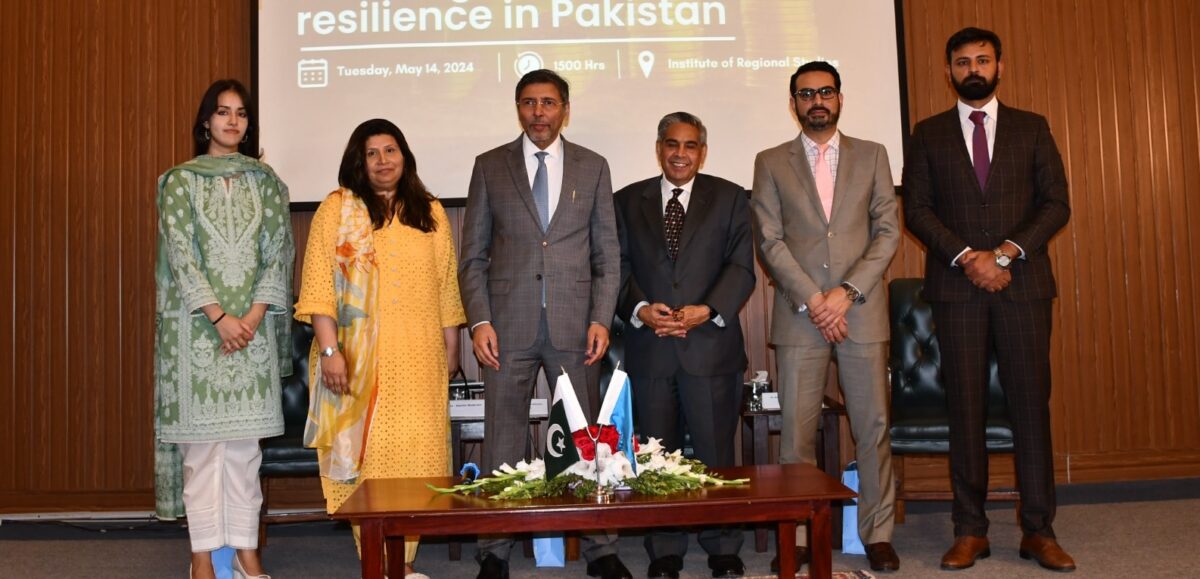ISLAMABAD, May 14 (APP): Prime Minister’s Coordinator on Climate Change, Romina Khurshid Alam said that climate finance was a pivotal point in the country’s journey towards securing sustainable resilience in Pakistan.
Addressing the Institute of Regional Studies (IRS)’s round-table titled “Climate Finance: Towards Securing Sustainable Resilience in Pakistan” here on Tuesday, the PM’s Coordinator said that country must strive to conceive bankable finance in the most cost-efficient manner, leveraging both public and private resources to maximise impact which necessitates a strategic approach aligned with national development priorities meeting rigorous standards of international financiers.
Romina said, “As we convene here today, the imperative for action on climate change has never been more pressing. The challenges we face are multi-faceted, demanding innovative solutions and concerted efforts at both the national and international levels.”
She mentioned that the role of non-state technocrats could not be overstated as their expertise and insights were invaluable in designing bankable projects that not only address climate vulnerabilities but also unlock economic opportunities for the local communities.
By harnessing the collective intelligence of technocrats on a regional level, we can ensure the viability and scalability of our climate finance initiatives.
Furthermore, climate diplomacy offers a powerful avenue for advancing our agenda on sustainable finance.
Pakistan must engage with the global community, leveraging diplomatic channels to advocate for our climate priorities and forge partnerships that enable greater access to finance.
By positioning ourselves as proactive and constructive players on the global stage, we can attract the necessary investments to drive our climate resilience efforts forward, she added.
Romina also mentioned that the establishment of a single data repository across different ministries was paramount for attracting international climate finance, whereas through enhanced data management and information sharing, the country could foster greater trust and collaboration in the pursuit of climate finance.
“The government is playing an important role in facilitating the private sector for more robust investments in climate resilience. This requires an enabling environment that incentivize sustainable practices and mitigate investment risks.
Implementing supportive policies, fostering innovation, and providing targeted financial instruments, we can unlock the full potential of private sector engagement in building climate resilience,” she said.
Earlier, Climate Consultant, Dawar Butt delivered his keynote address highlighting the country’s major flagships like Ten Billion Tree Tsunami Plantation Project, Living Indus Initiative, and the Quaid-e-Azam Solar Park.
He commented that solar, textile and transport particularly electric vehicles were booming climate-friendly sectors that could be focussed for making bankable projects with climate vision.
He urged for resolving the issue of federal and provincial stakeholders working in silos that resulted in lack of inter-ministerial coordination at federal level, accountability and misalignment of provincial interventions.
Climate Advisor, Planning Commission, Ali Tauqeer Sheikh said the international system was providing more finance for climate change than any other action at present, whereas it was important for the quarters concerned and the society as a whole to understand the term climate finance.
He added that the loss and damage fund was not about attribution of retribution or contribution, and the Green Climate Fund (GCF) and all other climate finance windows were competitive, north-driven and dominated by intermediaries that made the international climate fund not supply-side driven but led by Private Sector investments, interests
and innovations.
Ambassador Farrukh Khan, senior diplomat at MoFA said that there should be a carbon-footprint calculation of cement, energy, transport and steel sectors that demanded all stakeholders to join heads and develop synergies for the climate goals.
“We need to invest in rules regulations and governance and define rules for private sector to mobilize taxes, revenue and investments to enable Pakistan to achieve climate resilience.
Unless we don’t invest in ourselves to address the challenge of climate change, the international community is not going to support us. We need to embed climate resilience in all our development and regulatory initiatives,” he added.
Fawad Hayat from NDRMF said that there was dire need to ensure judicious use of money that was challenging amid growing population and spiralling climate disasters.
President IRS, Ambassador Jauhar Saleem in his vote of thanks termed the session as a myth buster on climate financing. He also highlighted the historical context of climate finance since 1992 that merely remained restricted rhetoric.
He noted that population boom was a serious issue that needed to be addressed to enhance climate resilience.
